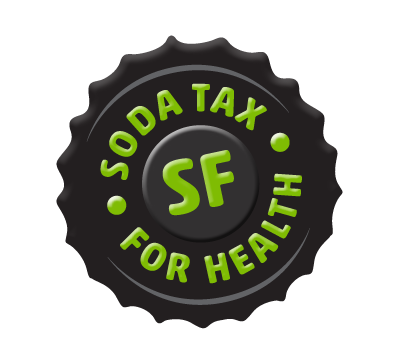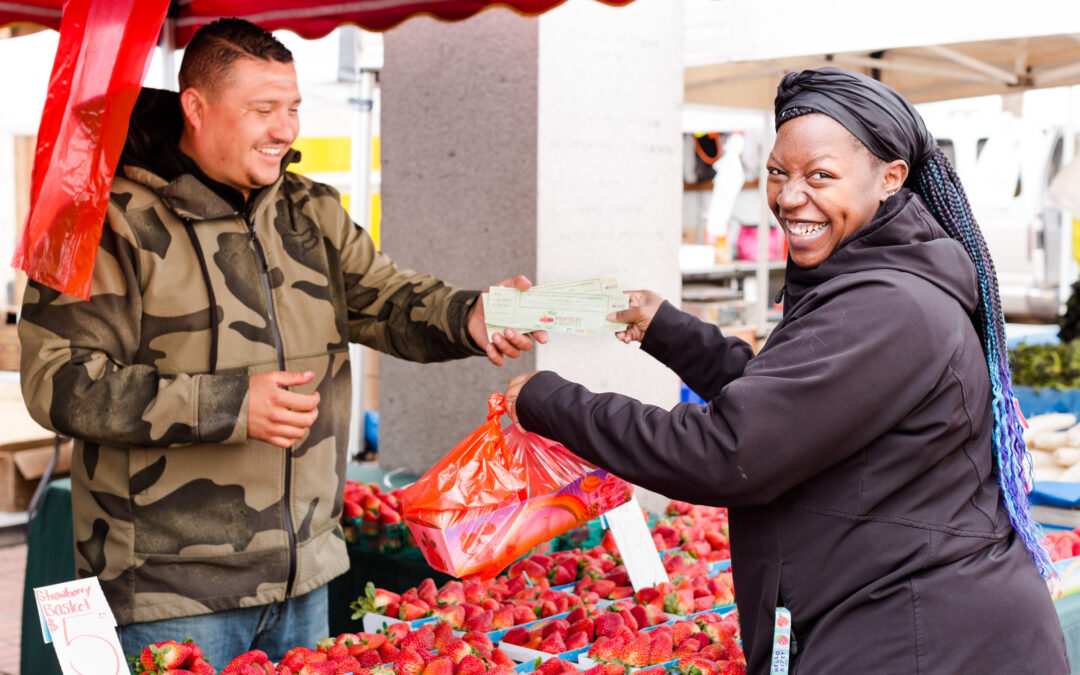Guest blogger, Ellen Garcia, Program Manager of EatSF-Vouchers 4 Veggies, shares how the SDDT-funded program is leading the movement to integrate nutrition interventions into healthcare.
By Ellen Garcia, Program Manager, EatSF-Vouchers 4 Veggies
EatSF-Vouchers 4 Veggies is an innovative, community-based food voucher program founded in 2015. It began as a project of UCSF physician-scholar Dr. Hilary Seligman, who was interested in the relationship between food insecurity and chronic diet-sensitive conditions like diabetes and hypertension. She suspected many low-income patients at San Francisco Hospital were unable to afford the fruits and vegetables recommended by their doctors, and that simply providing means to buy these foods could improve their symptoms. She decided to study the impact of providing produce vouchers, redeemable at nearby stores, on such patients. Her theory proved right, and Vouchers 4 Veggies was born.
Vouchers 4 Veggies does not generally work directly with patients or program participants; rather, we partner with clinics and community-based organizations to distribute vouchers to their own clients. Eligibility is determined by the clinic or organization, depending on need and/or health status. Participants receive $10 a week or more in fruit & vegetable vouchers for several months. Vouchers can be redeemed at over 40 San Francisco food vendors including farmers’ markets, corner stores, small specialty markets, and large grocery chains, allowing participants to choose where to shop, when to shop, what fruits & vegetables to buy, and how much to buy at once. The result is an extremely flexible health intervention that meets participants where they’re at and supports providers in engaging people around their most basic needs. What’s more, this model supports small food businesses and keeps dollars in the community. In fiscal year 22-23 alone, Vouchers 4 Veggies produce vouchers drove nearly a million dollars in fruit & vegetable purchases in San Francisco— over a third of which were made at farmers’ markets and BIPOC-owned small businesses.
A mere 8 years after Vouchers 4 Veggies was founded, public awareness of food insecurity – especially in the health professions – has changed dramatically. The idea that diet and disease are interconnected is not new, nor is the idea that food insecurity (having unreliable access to food) has health consequences. But we’re reaching a new understanding of health impacts from what’s come to be known as “nutrition insecurity”: having unreliable access to nutritious food. This idea has coalesced healthcare providers and food assistance programs around America into the Food As Medicine movement, which seeks to integrate nutrition interventions into healthcare and vice versa. It’s also become such an area of interest that it was a key topic at President Biden’s 2022 White House Conference on Hunger, Nutrition, and Health. Healthcare providers all over the country are now launching “produce prescription programs” but Vouchers 4 Veggies, with years of experience in San Francisco and program pilots across the country, has become a leader in the space by keeping its model simple and continually researching and refining for impact.
Vouchers 4 Veggies’ ongoing evaluation and research informs both program improvement and “nutrition security” advocacy at the city, state, and federal level. This research shows Vouchers 4 Veggies program participants consume more fruits and vegetables not only while receiving the vouchers, but also continue that consumption and behavior after their enrollment ends. Participants report feeling more comfortable trying new fruits & vegetables because of the vouchers, ultimately incorporating them into their meals and shopping patterns. And results are especially impressive for low-income pregnant people, served by Vouchers 4 Veggies in partnership with San Francisco WIC and other local clinics; one study of pregnant voucher recipients showed a 37% reduction in the odds of preterm birth!
Given that San Francisco’s preterm birth rate is higher than the state’s average, at 8.6%, such a reduction in preterm births illustrates how a simple intervention like produce vouchers can go a long way toward improving health equity. These results also show why Vouchers 4 Veggies believes produce prescriptions should be included in the medical care people receive. And working with healthcare partners throughout San Francisco and the state, we hope to make this a reality in the near future.


